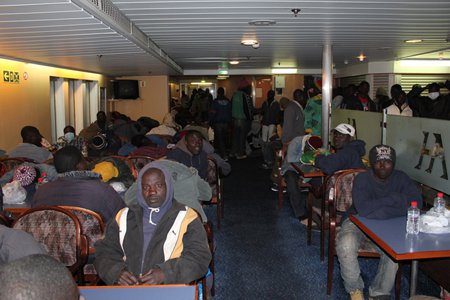Libya: the dead accumulate, the UN thinks, NATO procrastinates, the EU plans

(BRUSSELS2) “ We have 10.000 dead, 20.000 prisoners or missing, 30.000 wounded, 7.000 of whom are seriously injured. "... In Luxembourg, at the Foreign Affairs Council of the EU, last Tuesday, the international representatives of the CNT, Ali El Assaoui (former ambassador to the United Nations) and Mahmoud Jibril had delivered a black picture of the situation in Libya . This figure now seems exceeded if we are to believe the report taken up today (April 19) in Rome by the Italian Minister of Foreign Affairs, Franco Frattini, who cites 50.000 wounded in total. El Assaoui had also delivered a vigorous plea to European ministers. And the meeting planned for a "coffee" (1) was extended, in the end, for almost lunch... An hour and a half of exchanges on the situation on the spot but also to find out how to get out of the situation, what avenues for political negotiation existed in particular... Did the Europeans come out of it convinced that it was time to act a little stronger and a little more united? Is NATO in a position of strength? Is OCHA effective? We can doubt it.
Where is the soft power of the European Union?
Today, we feel a sense of unease in the light of the reaction of the international community, which seems very slow compared to the situation in Misrata, even non-existent compared to what prevails in the Berber villages, which are outside the media's field of vision but just as dramatic (2).
And the European Union does not seem to be in its best shape... To date, it has not offered any way of dialogue or taken any significant political initiative. Whether through a negotiating table, a contact group, negotiators, a special envoy, observers... All usual channels in such a conflict. The EU thus seems to be lagging behind other initiatives: that of the African Union (which it could or should have joined, even if it did not share all the presuppositions), that of the Contact Group. .. The only response, unequivocal and quick, was the adoption of economic sanctions. And the planning of a mission (EUFOR Libya) which one wonders if it would not have been better fulfilled by robust means of civil protection.
We can also wonder if the lesson of the Balkans has paid off. 20 years and 4 treaties later (Maastricht, Amsterdam, Nice, Lisbon), while the EU is now equipped with far more substantial instruments, the European response still seems as timid and disorderly weak as at the time, while its interests and safety are directly affected.
Where is the strength of NATO?
NATO's wait-and-see attitude during its first two weeks in control of the operation has already been extensively commented on on B2 (3). If it is explainable, it is no less irresponsible, with regard to the obligation of "protection of civilians" displayed by UN resolution 1973. But above all, it is dangerous for the Atlantic Alliance and the States which constitute it, it gives the impression of a weakness of commitment which reflects on its reputation. What is NATO worth today if it remains incapable of carrying out an operation that is after all very limited (without ground engagement) in a neighboring country? Today, despite all the reforms and strategic discussions, it is less able than yesterday to act. Deterrence being the primary weapon of an alliance, what is happening in Libya is even more of a "crash test" for NATO than for the EU.
Is the UN Office for Humanitarian Affairs (OCHA) up to the task?
Finally, when drawing lessons from this crisis, it will also be necessary to determine the exact role of the United Nations Office for Humanitarian Affairs (OCHA). And take responsibility for it. Haven't we asked too much of this organization which has not been present on Libyan territory directly since last week (and still in Benghazi)? Was he able to fulfill his mission? By delaying as much as possible the arrival of a European humanitarian support force (4), he wasted no time in sounding the alarm. UN Secretary-General Ban Ki Moon, visiting Budapest yesterday (April 18), acknowledged that the "humanitarian situation is particularly serious. There are tens of thousands of people whose basic needs are not being met. So we have a serious problem". Was a very restrictive analysis of the condition of "last resort" to allow the use of military means at the humanitarian level justified in this case, as OCHA maintains? European members who obviously did not want to be involved in this conflict and to commit their troops (even in a neutral way)...
Read also:

